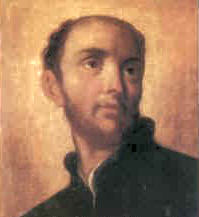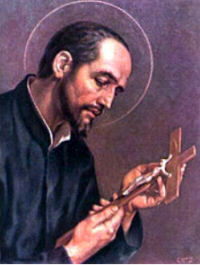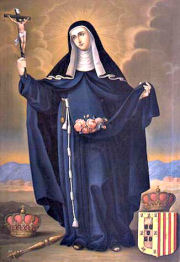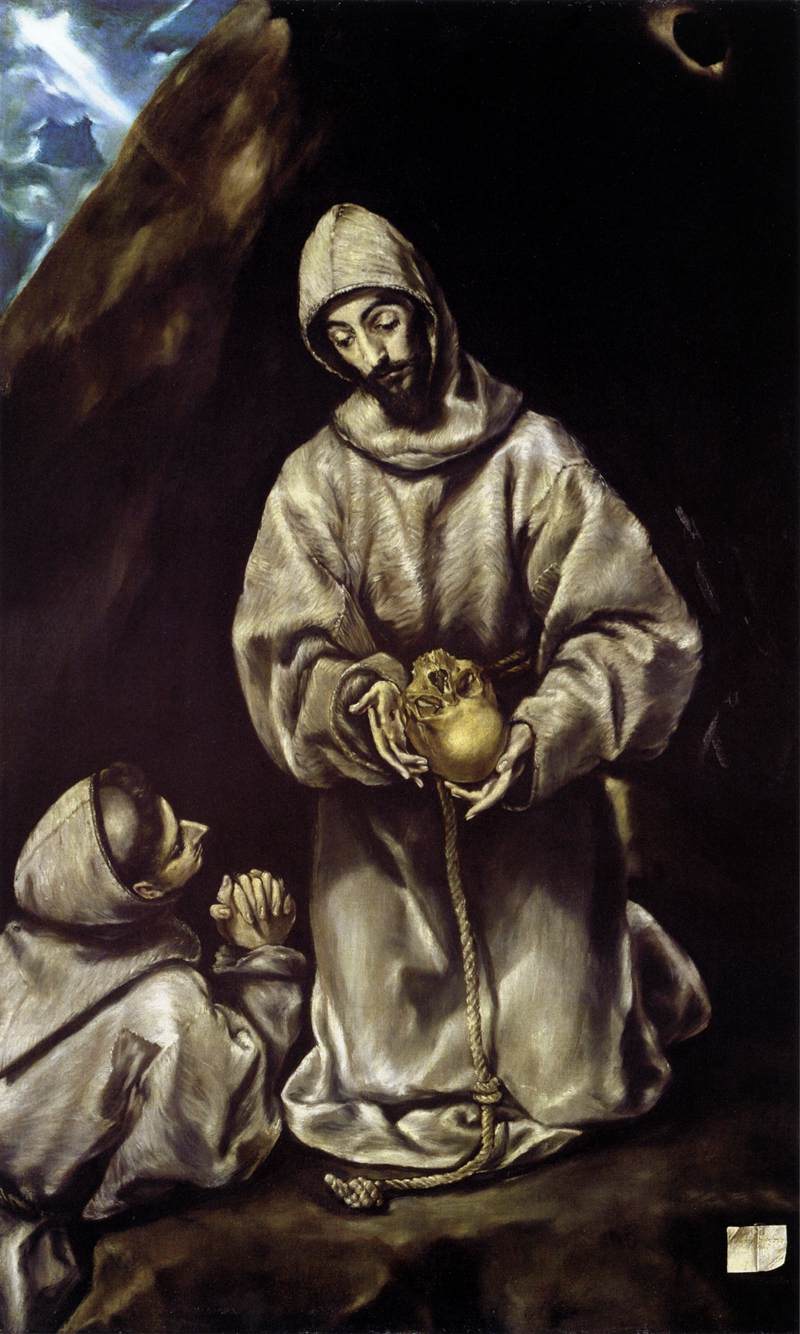14. Then came to him the disciples of John, saying, Why do we and the Pharisees fast often, but your disciples do not?
15. And Jesus said to them, Can the children of the bridechamber mourn, as long as the bridegroom is with them? but the days will come, when the bridegroom shall be taken from them, and then shall they fast.
16. No man puts a piece of new cloth into an old garment, for that which is put in to fill it up takes from the garment, and the rent is made worse.
17. Neither do men put new wine into old bottles: else the bottles break, and the wine runs out, and the bottles perish: but they put new wine into new bottles, and both are preserved.
GLOSS; When He had replied to them respecting eating and conversing with sinners they next assailed him on the matter of food, Then came to him the disciples of John, saying, Why do we and the Pharisees fast often, but you disciples do not?
JEROME; O boastful inquiry and ostentation of fasting much to be blamed, nor can John's disciples be excused for their taking part with the Pharisees who they knew had been condemned by John, and for bringing a false accusation against Him whom they knew their master had preached.
CHRYS; What they say comes to this, Be it that you do this as Physician of souls, but why do your disciples neglect fasting and approach such tables? And to augment the weight of their charge by comparison, they put themselves first, and then the Pharisees. They fasted as they learnt out of the Law, as the Pharisee spoke, I fast twice in the week; the others learnt it of John.
RABAN; For John drank neither wine, nor strong drink, increasing his merit by abstinence, because he had no power over nature. But the Lord who has power to forgive sins, why should He shun sinners that eat, since He has power to make them more righteous than those that eat not? Yet does Christ fast, that you should not avoid the command; but He eats with sinners that you may know His grace and power.
AUG; Though Matthew mentions only the disciples of John as having made this inquiry, the words of Mark rather seem to imply that some other persons spoke of others, that is, the guests spoke concerning the disciples of John and the Pharisees - this is still more evident from Luke; why then does Matthew here say, Then came to him the disciples of John, unless that they were there among other guests, all of whom with one consent put this objection to Him?
CHRYS; Or; Luke relates that the Pharisees, but Matthew that the disciples of John, said thus, because the Pharisees had taken them with them to ask the question , as they afterwards did the Herodians. Observe how when strangers, as before the Publicans, were to be defended, He accuses heavily those that blamed them; but when they brought a charge against His disciples, He makes answer with mildness. And Jesus said to them, Can the children of the bridegroom mourn as long as the bridegroom is with them? Before He had styled Himself Physician, now Bridegroom, calling to mind the words of John which he had said, He that has the bride is the bridegroom.
JEROME; Christ is the Bridegroom and the Church the Bride of this spiritual union the Apostles were born; they cannot mourn so long as they see the Bridegroom in the chamber with the Bride. But when the nuptials are past, and the time of the passion and resurrection is come, then shall the children of the Bridegroom fast. The days shall come when the bridegroom shall be taken from them and then shall they fast.
CHRYS; He means this; The present is a time of joy and rejoicing; sorrow is there fore not to be now brought forward and fasting is naturally grievous and to all those that are yet weak; for to those that seek to contemplate wisdom, it is pleasant; He therefore speaks here according to the former opinion. He also shows that this they did was not of gluttony but of a certain dispensation.
JEROME; Hence some thing that a fast ought to follow the forty days of Passion althought the say of Pentecost and the coming of the Holy Spirit immediately bring back our joy and festival. From this text accordingly, Montanus, Prisca, and Maximilla enjoin a forty days' abstinence after Pentecost, but it is the use of the Church too come to the Lord's passion and resurrection through humiliation of the flesh, that by carnal abstinence we may better be prepared for spiritual fullness.
CHRYS; Here again He confirms what He has said by examples of common things; No man puts a patch of undressed cloth into an old garment; for it takes away its wholeness from the garment and the rent is made worse; which is to say, My disciples are not yet become strong, but have need of much consideration; they are not yet renewed by the Spirit. On men in such a state it is not ideal to lay a burden of precepts. Herein He establishes a rule for His disciples, that they should receive with leniency disciples from out of the whole world.
REMIG; By the old garment He means His disciples, whom had not yet been renewed in all things. The patch of undressed, that is, of new cloth means the new grace, that is, time Gospel doctrine, of which fasting is a portion; and it was not meant that the stricter ordinances of fasting should be entrusted to them, lest they should be broken down by their severity, and forfeit that faith which they had; as He adds, It takes its wholeness from the garment, and the rent is made worse.
GLOSS; As much as to say, an undressed patch, that is, a new one, ought not to be put into an old garment, because it often takes away from the garment its wholeness, that is, its perfection, and then the rent is made worse. For a heavy burden laid on one that is untrained often destroys that good which was in him before.
REMIG; After two comparisons made, that of the wedding, and that of the undressed cloth, He adds a third concerning wine skins; Neither do men put new wine into old skins. By the old skins He means His disciples, who were not yet perfectly renewed. The new wine is the fullness of the Holy Spirit, and the depths of the heavenly mysteries, which His disciples could not then bear; but after the resurrection they became as new skins, and were filled with new wine when they received the Holy Spirit into their hearts. Whence also some said, These men are full of new wine.
CHRYS; Herein He also shows us the cause of those condescending words which He often addressed to them because of their weakness.
JEROME; Otherwise; By the old garment, and old skins, we must understand the Scribes and Pharisees; and by the piece of new cloth, and new wine, the Gospel precepts, which the Jews were not able to bear; so the rent was made worse. Something such the Galatians sought to do, to mix the precepts of the Law with the Gospel, and to put new wine into old skins. The word of the Gospel is therefore to be poured into the Apostles, rather than into the Scribes and Pharisees, who, corrupted by the traditions of the elders, were unable to preserve the purity of Christ's precepts.
GLOSS; This shows that the Apostles being hereafter to be replenished with newness of grace, ought not now to be bound to the old observances.
AUG; Otherwise; Every one who rightly fasts, either humbles his soul in the groaning of prayer, and bodily chastisement, or suspends the motion of carnal desire by the joys of spiritual meditation. And the Lord here makes answer respecting both kinds of fasting; concerning the first, which is in humiliation of soul, He says, The children of the bridegroom cannot mourn. Of the other which has a feast of the Spirit, He next speaks, where He says, No man puts a patch of undressed cloth. Then we must mourn because the Bridegroom is taken away from us. And we rightly mourn if we burn with desire of Him. Blessed they to whom it was granted before His passion to have Him present with them, to inquire of Him what they would, to hear what they ought to hear. Those days the fathers before His coming sought to gee, and saw them not, because they were placed in another dispensation, one in which He was proclaimed as coming, not one in which He was heard as present. For in us was fulfilled that He speaks of; The days shall come when you shall desire to see one of these days, and shall not be able. Who then will not mourn this? Who will not say, My tears have been my meat day and night, while they daily say to me , Where is now your God? With reason then did the Apostle seek to die and to be with Christ.
AUG; That Matthew writes here mourn; where Mark and Luke write fast, shows that the Lord spoke of that kind of fasting which pertains to humbling one's self in chastisement; as in the following comparisons lie may be supposed to have spoken of the other kind which pertains to the joy of a mind wrapped in spiritual thoughts, and therefore averted from the food of the body; showing that those who are occupied about the body, and owing to this retain their former desires, are not fit for this kind of fasting.
HILARY; Figuratively; this His answer, that while the Bridegroom was present with them, His disciples needed not to fast, teaches us the joy of His presence, and the sacrament of the holy food, which none shall lack, while He is present, that is, while one keeps Christ in the eye of the mind. He says, they shall fast when He is taken away from them, because all who do not believe that Christ is risen, shall not have the food of life. For in the faith of the resurrection the sacrament of the heavenly bread is received.
JEROME; Or; When He has departed from us for our sins, then is a fast to be proclaimed, then is mourning to be put on.
HILARY; By these examples He shows that neither our souls nor bodies, being so weakened by inveteracy of sin, are capable of the sacraments of the new grace.
RABAN; The different comparisons all refer to the same thing, and yet are they different; the garment by which we are covered abroad signifies our good works, which we perform when we are abroad; the wine with which we are refreshed with is the fervor of faith and charity, which creates us anew within.
Catena Aurea Matthew 9
Catholic Culture

Collect: Grant, O Lord, that in the spirit of the Apostle Paul we may pursue the surpassing knowledge of Jesus Christ, for, having learned it, Saint Anthony Zaccaria constantly preached your saving word in the Church. Through our Lord Jesus Christ, your Son, who lives and reigns with you in the unity of the Holy Spirit, one God, for ever and ever.
O God, author of peace and lover of charity, who adorned Saint Elizabeth of Portugal with a marvelous grace for reconciling those in conflict, grant, through her intercession, that we may become peacemakers, and so be called children of God. Through our Lord Jesus Christ, your Son, who lives and reigns with you in the unity of the Holy Spirit, one God, for ever and ever.
o Vegetable Soup with Rice
o Religion in the Home for Elementary School: July
o Religion in the Home for Preschool: July
o Sacramental Life in the Home: Baptism
o The Veneration of Saints
o Prayer Before a Crucifix
o July Devotion: The Precious Blood
o Litany for the Sick and Afflicted
o Prayer to St. Anthony Zaccaria
o Spirituality for Widows | Ronda Chervin Ph.D.
· Ordinary Time: July 5th
· Optional Memorial of St. Anthony Zaccaria, priest; St. Elizabeth of Portugal
Old Calendar: St. Anthony-Mary Zaccaria, confessor
St. Anthony Mary Zaccaria was the founder of the Clerks Regular of St. Paul, later called the Barnabites from the name of their principal church in Rome. He also founded a congregation of nuns which now no longer exists. He was a great admirer of St. Paul and was himself imbued with the teaching of the great Apostle, whom he gave to his followers as a model and a patron. He was a zealous and untiring preacher and completely wore himself out at this work; he died at the age of thirty-six on July 5, 1539.
St. Elizabeth of Portugal was the daughter of Peter III of Aragon and was named after her great-aunt, St. Elizabeth of Hungary, whose virtues she also inherited. In her married life with King Denis of Portugal she had to undergo a series of heavy trials which she endured with heroism. On more than one occasion she went to considerable pains to bring about peace between her children and their father. After her husband's death she became a Franciscan Tertiary and showed unfailing charity towards the poor. She died in 1336; her body has remained incorrupt. Before the reform of the General Roman Calendar St. Elizabeth's feast was celebrated on July 8.
St. Anthony
Anthony Mary Zaccaria was born of a noble family at Cremona in Lombardy, and even in childhood gave signs of his future sanctity. Very early he was distinguished for his virtues, piety towards God, devotion to the Blessed Virgin, and especially mercy towards the poor, who he more than once gave his own rich clothing for their relief. He studied the humanities at home, and then went to Pavia for philosophy and Padua for medicine, and easily surpassed his contemporaries both in purity of life and in mental ability. After gaining his degree in medicine, he returned home, where he understood that God had called him to the healing rather of souls than of bodies. He immediately gave himself to sacred studies. Meanwhile he never ceased to visit the sick, instruct children in Christian doctrine, and exhort the young to piety and the elders to reformation of their lives. While saying his first Mass after his ordination, he is said to have been seen by the amazed congregation in a blaze of heavenly light and surrounded by angels. He then made it his chief care to labor for the salvation of souls and the reformation of manners. He received strangers, the poor and afflicted, with paternal charity, and consoled them with holy words and material assistance, so that his house was known as the refuge of the afflicted and he himself was called by his fellow-citizens an angel and the father of his country.

Thinking that he would be able to do more for the Christian religion if he had fellow laborers in the Lord's vineyard, he communicated his thoughts to two noble and saintly men, Bartholomew Ferrari and James Morigia, and together with them founded at Milan a society of Clerks Regular, which from his great love for the apostle of the Gentiles, he called after St Paul. It was approved by Clement VII, confirmed by Paul III, and soon spread through many lands. He was also the founder and father of the Angelic Sisters. But he thought so humbly of himself that he would never be Superior of his own Order. So great was his patience that he endured with steadfastness the most terrible opposition to his religious. Such was his charity that he never ceased to exhort religious men to love God and priests to live after the manner of the apostles, and he organized many confraternities of married men. He often carried the cross through the streets and public squares, together with his religious, and by his fervent prayers and exhortations brought wicked men back to the way of salvation.
It is noteworthy that out of love for Jesus crucified he would have the mystery of the cross brought to the mind of all by the ringing of a bell on Friday afternoons about vesper time. The holy name of Christ was ever on his lips, and in his writings, and as a true disciple of St Paul, he ever bore the mortification of Christ in his body. He had a singular devotion to the Holy Eucharist, restored the custom of frequent communions, and is said to have introduced that of the public adoration of Forty Hours. Such was his love of purity that it seemed to restore life even to his lifeless body. He was also enriched with the heavenly gifts of ecstasy, tears, knowledge of future things, and the secrets of hearts and power over the enemy of mankind. At length, after many labors, he fell grievously sick at Guastalla, whither he had been summoned as arbitrator in the cause of peace. He was taken to Cremona, and died there amid the tears of his religious and in the embrace of his pious mother, whose approaching death he foretold. At the hour of his death he was consoled by a vision of the apostles, and prophesied the future growth of his Society. The people began immediately to show their devotion to this saint on account of his great holiness and of his numerous miracles. The cult was approved by Leo XIII, who solemnly canonized him on Ascension Day, 1897.
Excerpted from The Liturgical Year, Abbot Gueranger O.S.B.
Things to Do:
- St. Anthony had great devotion to Our Lord crucified. He institued the practice of tolling the church bells at 3 p.m. every Friday in remembrance of Christ's death on the cross. You could gather the family together at 3 p.m. to say the Prayer Before a Crucifix and ask St. Anthony to increase your love for our suffering Lord.
- St. Anthony promoted devotion to the Eucharistic Christ in the form of the Forty Hours devotion, public and solemn adoration of the Blessed Sacrament. Find a church that has adoration and make a visit today.
- St. Anthony was a doctor of medicine as well as a priest, today would be a good time to offer a special prayer for the sick.
- Learn more about and read some of St. Anthony's Letters at Spirituality of St. Anthony Zaccaria.
- Learn more about the Barnabites founded by St. Anthony.
- Try cooking Vegetable Soup with Rice today in honor of St. Anthony.
- Read CONTEMPLATION in St. Anthony Mary Zaccaria’s Spirituality.
St. Elizabeth of Portugal

Elizabeth of Portugal was married young: she was only twelve years old when she became the wife of King Denis of Portugal. She was the daughter of King Peter III of Aragon and at her baptism in 1271 received the name of her great-aunt, St. Elizabeth of Hungary. Even at that early age, she had a well-disciplined character and, like her namesake, looked after the poor and pilgrims, with the consent of her husband.
She inaugurated what today we would call social works in her kingdom, set up hostels for pilgrims and travelers, provided for the poor, established dowries for poor girls, founded a hospital and a house for penitent women at Torres Novas, and built an orphanage. Her husband was notoriously unfaithful to her, but she bore all this with patience and her sweetness of disposition was her greatest asset. She even looked after his illegitimate children as if they were her own and made provision for their proper education.
She had two children of her own, Alfonso and Constance, the son later rebelling against his father. St. Elizabeth of Portugal became the peacemaker and several times reconciled the son to the father. Through her efforts, war was averted between Castile and Aragon.
In 1324, her husband became ill and she devoted all of her attention to him, never leaving his room except to go to church. His illness was long and tedious, but he sincerely repented of his disordered life and died at Santarem in 1325. After his burial, she made a pilgrimage to Compostela and decided to enter the Poor Clare convent at Coimbra. Persuaded not to do this, she became a Franciscan tertiary and lived in a house close to the convent.
Elizabeth died at Estremoz at the age of sixty-six, en route there to bring about peace between her son and her nephew, Alfonso XI, of Castile. She was canonized by Urban VIII in 1625.
Excerpted from The One Year Book of Saints by Rev. Clifford Stevens
Patron: Against jealousy; brides; charitable societies; charitable workers; charities; Coimbra, Portugal; difficult marriages; falsely accused people; invoked in time of war; peace; queens; tertiaries; victims of adultery; victims of jealousy; victims of unfaithfulness; widows.
Symbols: Franciscan nun with a rose in her hand; Franciscan nun with a beggar nearby; Franciscan nun with a jug in her hand; Franciscan tertiary nun; woman carrying roses in her lap in winter; woman crowned with roses.
Things to Do:
- Our own circle of personal influence is usually where we can do the most good. It is useless to dream of going to faraway places to accomplish great deeds, when there is much to be done in our own backyard. We can influence those around us and, like St. Elizabeth of Portugal, we can accomplish wonders.






